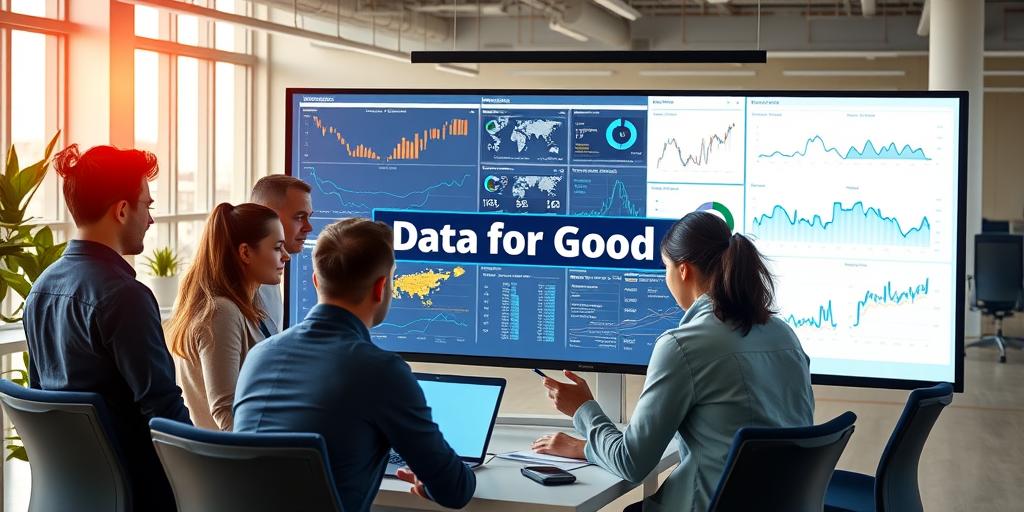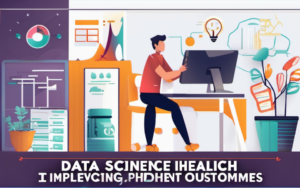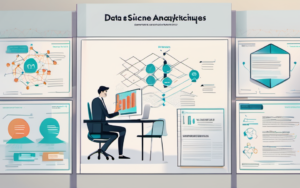The world is awash in data, and data science is increasingly being used to solve complex problems and drive innovation. While the field is often associated with profit-driven applications like targeted advertising and financial analysis, there’s a growing movement to harness the power of data for good. From improving healthcare outcomes to protecting the environment, data scientists are making a tangible difference in the lives of countless individuals and communities around the globe.
Introduction: The Power of Data for Social Impact
Data Science Beyond Profit: A Shift in Focus
Traditionally, data science has been primarily focused on maximizing profits for businesses. However, a growing number of data scientists are recognizing the potential of their skills to address pressing social issues. This shift in focus is driven by a desire to make a positive impact on the world and to use their expertise to create a more just and equitable society.
The Potential of Data to Address Global Challenges
The sheer volume and variety of data available today offer unprecedented opportunities to understand and solve complex social problems. Data can provide insights into patterns and trends, identify areas for improvement, and inform evidence-based decision-making. Whether it’s tackling poverty, improving education, or combating climate change, data science has the potential to be a powerful tool for positive change.
Case Studies: Data Science Making a Difference
Healthcare: Improving Patient Outcomes and Access
Predictive Analytics for Disease Prevention
Data science is transforming healthcare by enabling more effective disease prevention and early detection. By analyzing patient data, including medical history, lifestyle factors, and genetic information, data scientists can identify individuals at higher risk of developing certain diseases. This allows for targeted interventions and personalized treatments, ultimately improving patient outcomes and reducing healthcare costs.
Optimizing Healthcare Resource Allocation
Data can also be used to optimize the allocation of healthcare resources. For example, analyzing patient data can help hospitals predict future demand for specific services, allowing them to adjust staffing levels and allocate resources more efficiently. This can improve access to care for underserved communities and ensure that resources are used effectively.
Education: Empowering Learners and Educators
Personalized Learning Experiences
Data science is revolutionizing the way we learn and teach. By analyzing student performance data, educators can identify individual learning styles, strengths, and weaknesses. This information can be used to create personalized learning experiences that cater to each student’s unique needs, leading to improved engagement and academic outcomes.
Identifying and Addressing Learning Gaps
Data can also be used to identify and address learning gaps within a school system. By analyzing student data, educators can identify areas where students are struggling and develop targeted interventions to support their learning. This can help to close achievement gaps and ensure that all students have the opportunity to succeed.
Environmental Sustainability: Protecting Our Planet
Monitoring and Predicting Climate Change
Data science plays a crucial role in understanding and mitigating climate change. By analyzing data from satellites, weather stations, and other sources, scientists can monitor changes in the environment, predict future climate patterns, and develop strategies to reduce our carbon footprint.
Optimizing Resource Management
Data can also be used to optimize resource management and reduce environmental impact. For example, data science can help utilities companies predict energy demand, allowing them to adjust production levels and reduce waste. Similarly, data can be used to optimize water usage and reduce pollution in agriculture and manufacturing.
Challenges and Opportunities in Data for Good
Data Privacy and Ethical Considerations
As data science becomes increasingly prevalent in social impact initiatives, it’s critical to address data privacy and ethical considerations. It’s essential to ensure that data is collected, stored, and used responsibly, respecting individual privacy and protecting sensitive information. This includes obtaining informed consent, implementing robust security measures, and promoting transparency in data usage.
Bridging the Gap Between Data Scientists and Social Impact Organizations
A key challenge in the field of data for good is bridging the gap between data scientists and social impact organizations. Many social impact organizations lack the technical expertise and resources to effectively leverage data. Conversely, data scientists may not have the experience or understanding of social issues needed to effectively apply their skills to real-world problems. Building strong partnerships and fostering collaboration between these two groups is essential for maximizing the impact of data science in social good initiatives.
The Importance of Collaboration and Open Data
The challenges of data privacy and access to data resources can be overcome through collaboration and open data initiatives. Sharing data and expertise between researchers, governments, and non-profit organizations can accelerate progress in addressing social challenges. Promoting the use of open data platforms and establishing common standards for data sharing can help to break down barriers and foster a more collaborative data ecosystem.
A Call to Action: Embracing Data for Positive Change
The potential of data science for good is immense, but it’s up to us to harness its power responsibly and effectively. By embracing data-driven solutions, fostering collaboration, and addressing ethical concerns, we can create a more just and sustainable world for all. As data scientists and social impact leaders, we have a responsibility to leverage our knowledge and skills to make a positive difference in the lives of others.
The future of data for good is bright, and we can inspire the next generation of data scientists to embrace a mission-driven approach to their work. By empowering young people with the skills and knowledge they need to use data for positive change, we can create a future where technology is used to solve the world’s most pressing problems and build a more equitable and sustainable world for all.




